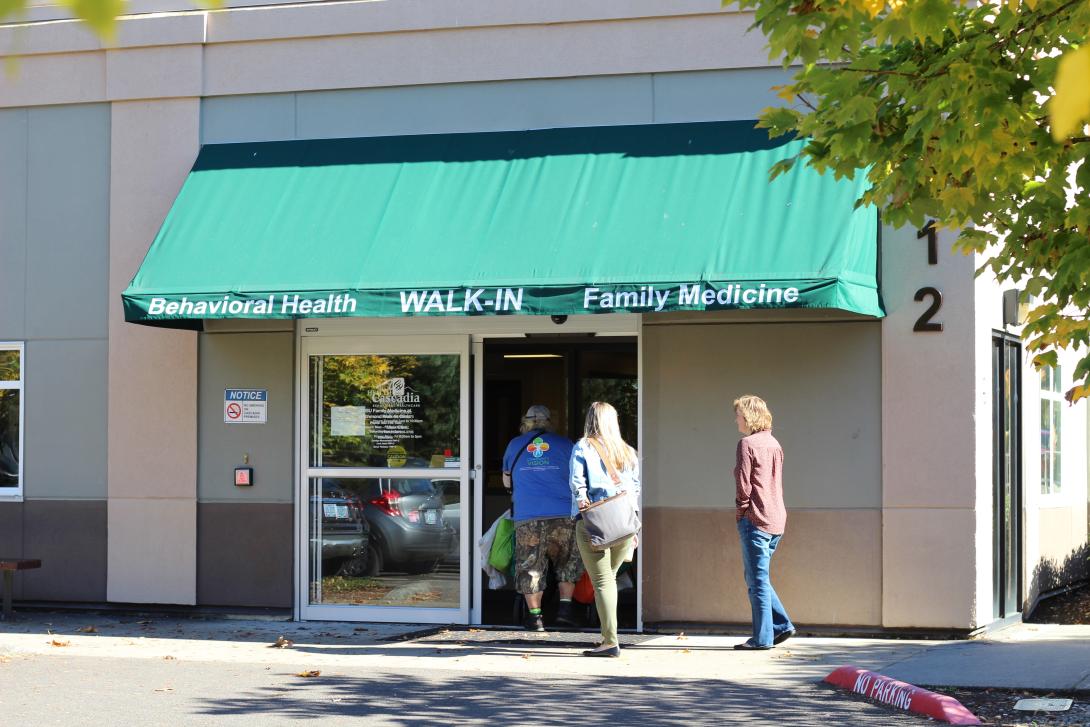
Heika Wilson controlled her bipolar disorder for years with medication and regular visits to a therapist. When her husband developed his 3D printing business, she was there to help.
But then Wilson’s medications stopped working. She struggled to get off the couch and stopped cooking, driving and sleeping. When she begged her local clinic in Klamath Falls for a mental health appointment, they told her she would have to wait three months -- which Wilson said could have killed her if she hadn’t seen a private provider -- at a cost of $175.
Wilson is among many Medicaid patients unable to get adequate mental health care in Oregon. The state’s Medicaid program covers the cost of approved mental health care, but the counties and nonprofit providers responsible for delivering that care can’t retain enough mental health workers to meet the demand. Low pay and heavy workloads are pushing mental health specialists to leave for private practices where they can get paid more by private insurance.
As a result, patients experiencing mental health crises often don't get the urgent care they need. Nearly a third of non-emergency mental health patients in Multnomah County had to wait more than two weeks to get their first mental health appointment, according to Multnomah County.
Long waits can mean the difference between life or death when a patient is in crisis.
“If their crisis is one of self-harm or suicidal feelings and they’re unable to step into ongoing care, you can imagine that’s really serious,” said Bob Joondeph, executive director of Disability Rights Oregon.
Problem of Pay
Medicaid often pays providers 50 percent less than what they’ll get from a commercial insurer, according to Simona Borza, a psychiatric mental health nurse practitioner in Tigard.
Borza used to take Medicaid patients but stopped accepting the insurance which she felt required too much paperwork for very little pay. Medicaid payments “would not cover even the amount of electricity” to keep the lights on, she said. Low pay is making it hard to retain qualified mental health workers at county behavioral health practices too, Devarshi Bajpai, Multnomah County’s mental health Medicaid manager, said in a recent interview.
“We have a shortage of practitioners and qualified mental health professionals,” Bajpai said.
Oregon Representative Sheri Malstrom, D-Beaverton, said lawmakers need to prioritize spending on behavioral health.
“We just need to prioritize mental health, legislatively,” she said. “This isn’t only about spending wiser. The fix is that we need to have more revenue.”
Malstrom said the pay should be increased to attract more providers.
“When something pays well, you get more people who want to do the job,” she said. “When you really look at what untreated mental health costs us as a society, we can’t afford not to treat them better.”
Existing System Falls Short
Oregon’s mental health system for Medicaid patients is a multilayered system. The Oregon Health Plan, which oversees Medicaid in the state, gives state and federal Medicaid dollars to coordinated care organizations, which act as Medicaid insurance companies. They, in turn, contract with providers.
In the Portland area, there’s one overall coordinated care provider -- Health Share -- that provides state and federal Medicaid funding to four groups offering care plans. Those organizations -- CareOregon, Providence Health Plan, Kaiser Permanente and Tuality Healthcare -- cover medical care and prescriptions but not mental health care. Health Share has that responsibility. In 2017, Health Share allocated 10 percent of its $1 billion budget toward mental health and another 2.5 percent to substance use disorder treatment.
Oregon’s Medicaid budget was $6.4 billion in fiscal year 2018 -- $5 billion from the federal government and $1.4 billion from the state. Emergency room visits are among the most expensive services paid for by Medicaid, and many of them are driven by non-emergency mental health-related problems, according to data from the U.S. Department of Health and Human Services. About 8 percent of emergency room visits nationally are related to mental health problems, and a fifth of those visits are billed to Medicaid, the data showed.
According to the Kaiser Family Foundation, 20 percent of Medicaid enrollees in 2011 had behavioral health diagnoses, accounting for nearly 50 percent of spending.
The cost of emergency room visits have escalated in recent years, costing an average of $1,414 in Oregon in 2016, according to the Health Care Cost Institute.
“When people go to an emergency room without an emergency, that indicates that they’re not getting care elsewhere,” said Dr. Jeffrey Eisen, Cascadia Behavioral Healthcare’s chief medical officer.
The Oregon Health Authority called behavioral health care a chief priority in a recent report setting the direction for the next phase of its coordinated care program, known as CCO 2.0. The report called for coordinated care organizations that pay for care for Medicaid patients to increase access to behavioral health care by making the system easier to navigate, expanding the network of providers so patients have more choice in who they see and decreasing wait times for patients like Wilson.
Patients Left Waiting
Multnomah County officials acknowledge that the wait to see a mental health provider for the first time is a problem for many patients. But they say that’s because it has many more clients than expected. In 2014, the county covered mental health services for 75,000 Medicaid clients. By 2018, that number had grown to 170,000 with the expansion of Medicaid. The added numbers -- now one in four Oregonians is on Medicaid -- has stretched the system.
“Our Medicaid network was built for (those) 75,000 members,” said Bajpai, Multnomah County’s Medicaid planning manager.
Oregon’s mental health providers who accept Medicaid track first-appointment wait times, with a goal of ensuring that 100 percent of their patients are offered an appointment within two weeks, Bajpai said. In 2017, that number hovered around 70 percent but fell to about 50 percent earlier this year.
An analysis this year of the county’s mental health system noted the consequences of long wait times for Medicaid patients.
“It is during this gap that individuals are likely to become disengaged, resulting in a perpetuation of unmet needs,” said the analysis by the Human Services Research Institute, a nonprofit research group. Many patients end up in emergency rooms or mental hospitals because of those wait times, which hurts most patients and drains the Medicaid system, the analysis said.
Early this year one of the coordinated care organizations in the Portland area, FamilyCare, shut down amid a rate dispute with the Oregon Health Authority. Its closure shifted FamilyCare’s 103,000 patients to Health Share and thus to the three counties in the Portland area for mental health care. Multnomah County alone took on about 50,000 new Medicaid members.
Since the closure of FamilyShare, Health Share has added 14 mental health groups to its provider network and 25 practitioners, for a current total of 138 provider groups and 59 practitioners.
Multnomah County also has expanded its network.
In July, 70 percent of Multnomah County’s patients were able to book an appointment within the two-week state-mandated time frame. But that still leaves 30 percent of patients waiting longer than that.
“That’s not good,” said Chris Bouneff, executive director of the National Alliance on Mental Illness Oregon. “In many if not most circumstances, people drop out of care.”
Bouneff blasted health officials for only tracking wait times for the first appointment.
“It’s a meaningless metric,” Bouneff said. “If you don’t measure the time from the first to the second and to the third appointment, you have no idea if someone is engaging in care.”
With providers already skating on thin margins, he said that the system needs to reduce no-show rates and ensure that patients are getting care.
Dropped Patients
The Medicaid mental health system, like other health care, is based on a fee-for-service model. Therapists are paid for completed appointments. If clients don’t show up, providers lose revenue.
That can lead clinics to drop all but the most consistent clients -- and because of high demand, clinics can be picky. Critics say a different payment method, focused on patient outcomes instead of appointments, would help prevent vulnerable patients like Wilson from being abandoned.
Oregon already has a program that operates that way: Assertive Community Treatment. That program, aimed at high-risk patients coping with homelessness and other unstable conditions, pays mental health care providers on a case rate basis. The provider is paid a flat rate for taking the client on and receives additional premiums for positive outcomes, like reduced emergency room visits. Because there’s no penalty when a client fails to make appointments, there’s no incentive to drop difficult clients.
There are currently 23 Assertive Community Treatment teams throughout the state, and 12 more are being formed. The Multnomah County program has 350 slots serving mostly homeless individuals. Care providers meet clients in encampments and homeless shelters to help meet their basic needs and walk them through the Medicaid system so they can get stabilized.
“We want our providers to find people and engage them,” Bajpai said, “to have a system where if people don’t show up, you still try to engage them.”
That payment strategy is still relatively rare and limited to specific programs, but Oregon is working on a next generation Medicaid system that will work towards an outcomes-based pay system. It will include incentives for care organizations to lower the number of client visits to emergency rooms -- a strong indication that the patient is getting the care they need without plunging into a crisis.
Mike Morris, Oregon’s interim director of behavioral health, says the new regulations will be more flexible, more integrated and more focused on outcomes for patients rather than services rendered.
“We try not to dictate too much in regards to how they deliver services but hold them more accountable for the outcomes for individuals,” Morris says.
It’s too late for Wilson, the bipolar patient who couldn't get Medicaid care when she needed it. After her mental health crisis, she moved to Belize because of its lower medical costs.
“It’s primarily because of the fear that if I had an episode like that again, we wouldn’t be able to survive or pay our bills,” she said.
Despite living on a limited income, Wilson pays more than $100 a month to see an American physician over Skype. She pays out of pocket for medications from a local pharmacy, where they cost significantly less -- even without insurance -- than in the United States.
She no longer faces uncertainty as she did in Klamath Falls, where she was punished after missing one appointment.
“My counselor could have reached out to me to see if I need help, and he didn’t do that,” she said, her voice steely with disappointment. “That doctor said, if this isn’t working for you, then I'm available. And he wasn't."
You can reach Kelly Kenoyer at [email protected].

It's Chris Bouneff, not Douneff.
It's Assertive Community Treatment, not Asserted Community Treatment.